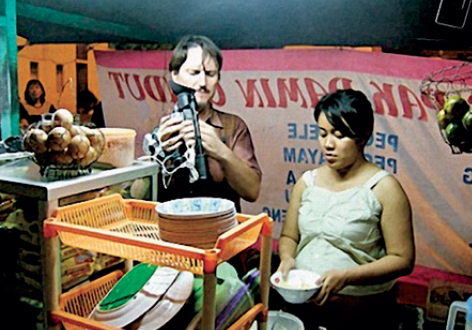One thing that Indonesia and the Fulbright Program gave me was the space and time to really think through and expand what I wanted to do in film, how I wanted to produce films, and examine what the role of film was in social change. It was when I was teaching at the Bandung Institute of Technology (ITB) that I really started to pull together ideas about integrating my teaching and filmmaking practice, ideas that I’d been formulating throughout my 20 years of filmmaking and teaching. I wanted to train Indonesians in filmmaking so that their own voices would get heard and influence global opinion and action, particularly around issues of social and economic development.
Actually, dengue fever played a role in this. I came down with dengue in Bandung, and it was the first time in many years that I was forced to rest.
The illness required that I stay in bed and not move for a week. I was sicker than I’d ever been. But it gave me a lot of time to think about things, and by the end of it, all these things really solidified in my head and I thought: this is very, very healthy. It was a very useful illness. I ended up writing a treatise about the elements of participatory film, the elements of training, and the elements of public engagement through film that needed to come together into one project, and I began to develop a new model of communitysupported filmmaking. Inspired by the model of community-supported agriculture, community-supported film would apply the principle of investing directly in people on the ground to support the production of highquality films from a local perspective.
The students at ITB were incredible. They are so smart, so engaged in their creative work, and there’s such a vibrant, underground experimental video world there. The real highlight of the year was an exhibit we put together in experimental video, sound, and installation art. Completely thrilling. It really became this wonderful experience of working with a group of great students and alumni, astutely directed by the dean, Biranul Anas Zaman, and Professor Deden-Hendan Durahman, on a new area of creativity that helped to launch an expanded approach to coursework and curriculum. It was the first student video and sound art exhibition at the university in the prestigious Soemardja Gallery, and it was extremely well received by the university, faculty, and local art community.
Prior to that I taught for a semester at the Jakarta Arts Institute (IKJ). One of the best things to come out of my time there was a videosonic film called “Instant Noodles” in partnership with Pak Sardono Kusomo, the institute’s dean, and Yola Yulfianti, a choreographer and dancer in her own right who was a member of Sardono’s dance troupe
The film juxtaposed consumption and environmental destruction. It was exhibited in the United States, around the same time as the Bali conference on global warming, as part of an exhibition called “Greed, Guilt and Grappling; Six Artists Respond to Climate Change.” Sardono has been working with the forest people for many years. It was very inspiring to see how he was engaging people in the art-making process and then creating performance work around forest issues.
Out of these experiences developed what has become my life’s work, the newly formed nonprofit organization called Community Supported Film (CSFilm). It’s based on the idea that local perspectives are essential, if we are to make the right decisions about how to help others in their process of socioeconomic development. This has led to what I’m now doing in Afghanistan, working with people there and training them in documentary filmmaking and video journalism. The films they produced are being used in dozens of screenings and presentations from U.S. Congressional briefings to international film festivals. We have plans to train local people in filmmaking in Haiti, too. I’d love to return to Indonesia one day and develop CSFilm’s program there as well.
My Fulbright grant in Indonesia provided a solid foundation on which to integrate my experience and passion for filmmaking and teaching. The context and time provided by this opportunity expanded my perspectives and created the pathway for the full development of CSFilm and its critical work to use media as a tool to help build a more peaceful and equitable world.




